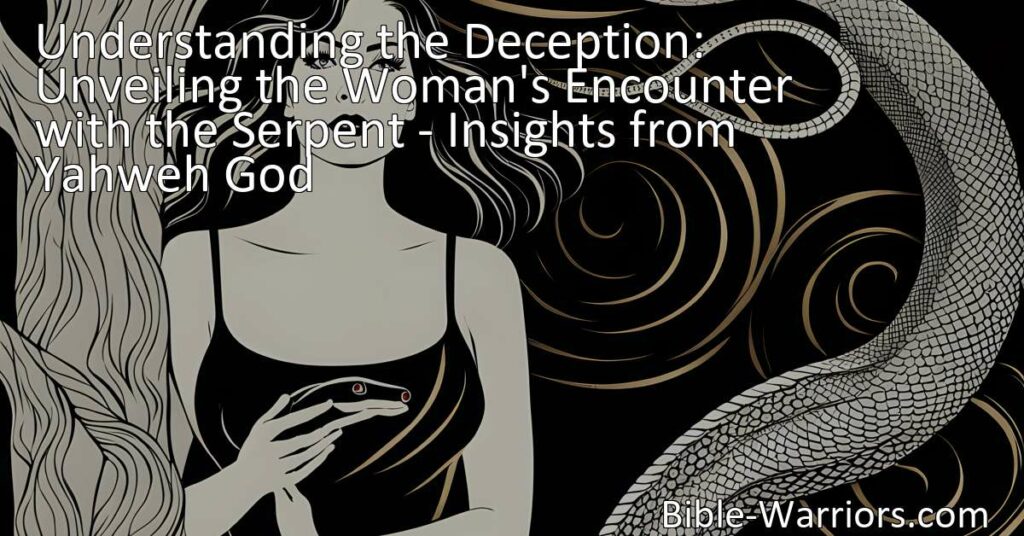Genesis 3:13 – Yahweh God said to the woman, “What is this you have done?” The woman said, “The serpent deceived me, and I ate.”
Delving into the biblical account of the woman’s encounter with the serpent in Genesis, we uncover the cunning tactics of deception used. By recognizing the power of deception and its consequences, we learn valuable lessons about discernment, taking responsibility for our actions, and seeking guidance from trusted sources like the Bible to navigate a world where deception often lurks.
Table of Contents
Introduction:
In the book of Genesis, we find a fascinating account of the first deception in human history. Yahweh God confronts the woman, asking, “What is this you have done?” Her response exposes the cunning nature of the serpent and sheds light on the importance of understanding deception. In this article, we will delve into this biblical verse, gaining insights from Yahweh God himself, exploring the deception the woman faced and the lessons we can learn from it. Join us as we embark on a journey to understand and unveil the woman’s encounter with the serpent.
Understanding the Context:
Before we dive into the woman’s encounter, let’s set the scene. God had created a perfect and harmonious world, placing the first man and woman in the Garden of Eden. Yahweh God gave them the freedom to eat from any tree except the tree of the knowledge of good and evil. However, the cunning serpent entered the picture, enticing the woman with tactics meant to deceive her.
The Serpent’s Deception:
We can imagine the woman going about her daily activities, unaware of the serpent lurking nearby. Suddenly, the serpent speaks, questioning God’s command not to eat from the forbidden tree. The serpent plants a seed of doubt, suggesting that God’s motives were selfish and withholding knowledge that would elevate humans to a godlike status. The serpent was convincing, and the woman began to question the validity of God’s words.
The Power of Deception:
The serpent’s deception lies not only in the words it spoke but also in the emotions it stirred within the woman. The serpent preyed on her desire for knowledge, power, and self-importance. It appealed to her curiosity, promising that once she ate the forbidden fruit, her eyes would be opened, and she would become like God, knowing both good and evil. The serpent exploited the woman’s vulnerability, hiding the true consequences of disobedience.
The Woman’s Response:
After succumbing to the serpent’s deceit, the woman faced the consequences of her actions. When questioned by Yahweh God, she confessed that the serpent had deceived her and led her to eat from the forbidden tree. Her admission reveals an important lesson; deception can blind us to the truth, leading us astray from what we know is right. However, it is commendable that the woman took ownership of her actions and did not try to shift the blame entirely onto the serpent.
Lessons to be Learned:
Yahweh God’s encounter with the woman holds valuable insights for us today. Firstly, it emphasizes the need for discernment in the face of deception. We must be cautious and recognize that not everything that appears appealing or promising is good for us. Just as the woman fell for the serpent’s enticing words, we too can become susceptible to deception in various aspects of our lives.
Secondly, the woman’s admission of being deceived teaches us the importance of taking responsibility for our actions. In a world where blame-shifting is prevalent, acknowledging our mistakes is a significant step towards growth and redemption.
Thirdly, this verse reminds us of the consequences that deception can bring. The woman’s disobedience resulted in her expulsion from the Garden of Eden and introduced sin into the world. Deception may provide temporary satisfaction or a fleeting sense of power, but its long-term consequences can be detrimental.
Incorporating these Insights into Our Lives:
To protect ourselves from deception, we can cultivate discernment by seeking wisdom and guidance from trusted sources. God’s Word, the Bible, provides a solid foundation for making wise choices and discerning truth from falsehood. Building a strong moral compass will help us navigate life‘s challenges and avoid falling into the traps of deception.
Furthermore, accepting responsibility for our actions is vital for personal growth and healthy relationships. By acknowledging our mistakes, we open the door to forgiveness and restoration. This verse reminds us that even when we have been deceived, taking responsibility is a step towards healing and rebuilding trust.
Conclusion:
As we conclude our exploration of the woman’s encounter with the serpent, we gain valuable insights from Yahweh God himself. Deception can be enticing and destructive, as demonstrated by the serpent’s cunning tactics. By understanding the nature of deception, learning from the woman’s response, and applying these insights to our own lives, we can strive towards a more discerning and responsible existence. Let us be vigilant and seek God’s guidance as we navigate through a world where deception often lurks.
Freely Shareable Bible Verse Image Genesis 3:13
I hope this Bible verse image brings you hope and peace. Share it with someone who needs it today!



